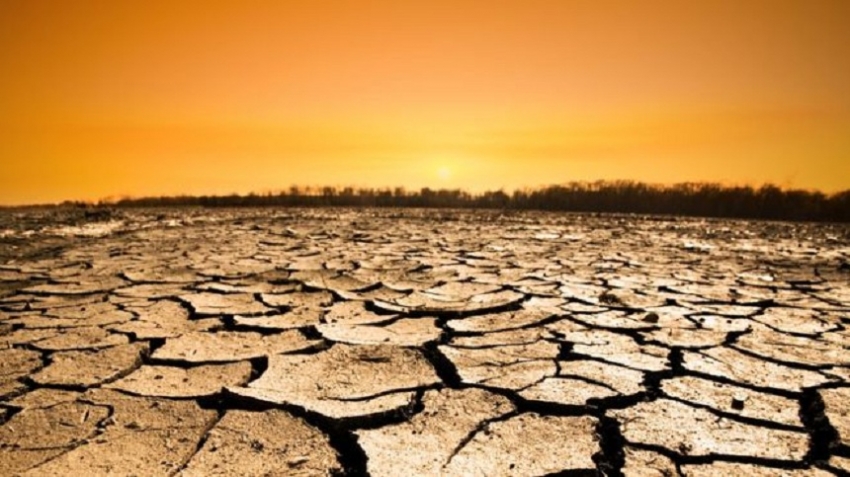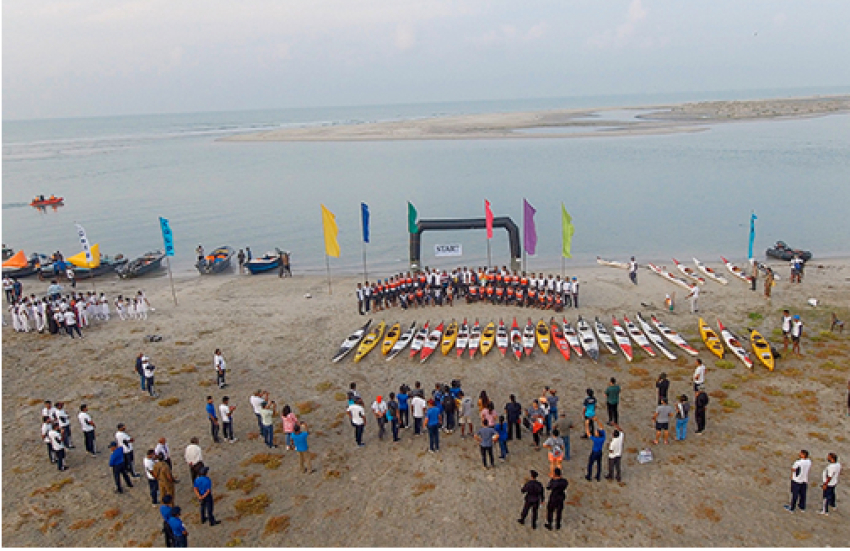By James Griffiths, CNN
(CNN)Tall and stony-faced, with a long and bitter history of fighting for democracy, Tongan leader Akilisi Pōhiva is not someone you'd expect to break down in tears at an intergovernmental summit.At a meeting of Pacific leaders last month in the tiny island nation of Tuvalu, other attendees said Pōhiva was overcome with emotion as he tried to secure Australian Prime Minister Scott Morrison's support for a more forceful approach to tackling the climate crisis.
He was not the only one frustrated by Morrison's apparent lack of concern for the danger that smaller Pacific nations face as sea levels rise. "You are concerned with saving your economy," said Tuvalu's Prime Minister Enele Sopoaga to Morrison. "I'm concerned about saving my people." Fijian leader Frank Bainimarama later summarized the meeting as settling "for the status quo."
Climate change is not affecting the world equally or at the same pace. And the forum's failure to agree on stronger action was a pointed reminder that the countries most immediately endangered may not be able to count on others for a quick solution.
Increasingly, countries like Tonga and Tuvalu may consider going it alone by turning to geo-engineering -- a "deliberate large-scale intervention in the Earth's climate system" -- that can require less international consensus.
The Pacific nation of Tuvalu faces the very real risk of sinking under the waves due to climate change.
The Pacific nation of Tuvalu faces the very real risk of sinking under the waves due to climate change.
Geoengineering has long been seen as something out of science fiction, or a dangerous distraction from more practical solutions to climate change. But for the countries that are running out of time, it offers a last throw of the dice before they sink beneath the waves.
"(For these countries) there might be a risk of harm from doing this stuff, but you've got to balance this against the certain risks of unabated climate change," said Jeff McGee, a senior lecturer in climate change law at the University of Tasmania.
What is geoengineering? There are two main categories of geoengineering: carbon dioxide removal, and more radical methods which seek to reflect sunlight and thus cool the Earth.Some efforts to scrub carbon from the atmosphere are underway, but many methods -- apart from planting loads of trees -- remain energy intensive, making them difficult to do at scale while remaining carbon neutral.
"Pulling carbon from the atmosphere is very desirable if we could achieve it at scale," said Andy Parker, co-author of the Royal Society report and project director at the Solar Radiation Management Governance Initiative (SRMGI). "But based on the technologies we have at the moment it would be very slow and expensive."For a long time, many in the climate community saw geoengineering as a potential distraction from much needed controls on emissions, providing an excuse for continued inaction, said Jan McDonald, a professor of environmental law at the University of Tasmania. However that inaction occurred regardless, and now geoengineering is beginning to seem like a necessary step as well as emissions mitigation.
"Back in the very early 1990s, nobody wanted to talk about adaptation because they were worried that would take away from the mitigation imperative. Everyone is willing to talk about it now," McDonald said. "We're on the cusp of that era now in terms of solar radiation management."
Solar radiation management, or SRM, is an attractive option for many because -- in theory -- it could provide a cost-effective way of reducing global temperatures and staving off some of the worst effects of climate change while the international community seeks a better solution.
"There have been big, big problems in decarbonizing enough to meet the 2 degree target," said John Moore, chief scientist at Beijing Normal University's College of Global Change and Earth System Science, one of the world's largest geoengineering research programs.
"People see (SRM) as a potential solution to avoid these overshoots in temperature where you might get tipping points."
Play Video
The race to save the Great Barrier Reef
All SRM methods focus on reflecting inbound sunlight back into space, reducing the amount of heat absorbed by the Earth and lowering global temperatures, or at least halting their rise.
The most effective solution appears to be stratospheric sulphate injection, whereby large amounts of reflective particles are sprayed into the upper atmosphere."That's not doable by anybody at the moment, the planes don't exist in sufficient numbers and sizes to do that effectively," Moore said.
Yet while research into exactly how to get the particles into the stratosphere cheaply is still underway, the science behind the method is solid. That's because we can trace similar drops in global temperatures during major volcano eruptions, when ash pours into the upper atmosphere, reflecting large amounts of sunlight.The eruption of Mount Tambora in Indonesia in 1815 led to the "year without a summer," during which global temperatures temporarily dropped by as much as 3C and crops failed across Europe and North America. Not all eruptions are so drastic in their effect -- when Mount Pinatubo in the Philippines erupted in 1991 it caused global temperatures to drop between 0.1 and 0.6C during the almost two years the ash remained in the upper atmosphere.
While the theory behind spraying particles into the stratosphere may be somewhat strong, the consequences of doing this deliberately for an extended period are still unclear.
"If you want to quickly reduce global temperatures, then the only known method currently is solar geoengineering," said Parker, the SRMGI expert. "The problem is we don't know what the impacts would be."
According to a 2017 report by the Overseas Development Initiative, a UK-based think tank, "potential downsides of SRM include changes in regional weather patterns that could lead to droughts in Africa and Asia, damage to the ozone layer, continued ocean acidification, impacts on natural ecosystems and agricultural crops, impacts on tropospheric chemistry, diminished radiation for solar power, and the risk of human error."
More immediately practical and less risky methods include spraying seawater into the lower atmosphere to brighten clouds and enable them to reflect more sunlight, as well as thinning cirrus clouds -- which trap heat and prevent it from escaping to space.
Play Video
It's not only CO2. These greenhouse gasses are just as bad 01:26
Should developing countries take action?
So far, efforts to tackle the climate crisis have largely focused on international agreements to reduce emissions, ones that have been -- by and large -- profoundly unsuccessful in doing so.
While the most effective way of lowering global temperatures is to reduce emissions, this is something that requires a global response, unlike some geoengineering methods which could be carried out -- at least in theory -- by a single country or group of countries.
"Unfortunately, the most environmentally responsible way is also the most politically difficult," Ken Caldeira, a climate scientist at the Carnegie Institution for Science, said last year. "If there's a leader of a country whose people are starving, and they think by injecting some particles in the stratosphere they can feed their people and alleviate suffering, the political pressure to do that is going to be intense."
As research continues into geoengineering processes, they can be expected to become cheaper and more practical. Some have even suggested that research itself may be too risky, because it leads down the slippery slope of taking action.
But while the global community would arguably be irresponsible in focusing on radical, untested geoengineering approaches rather than finally acting to tackle emissions, individual nations -- faced with the reality of a worsening crisis -- may feel differently.
Such proposals "could have widespread impacts beyond the territory of a country that decides to use them, impacting regional precipitation and monsoon patterns," and would raise obligations under the "no harm" principle in international law, said Kerryn Brent, a legal expert at the University of Tasmania.
However, this is "not a rule to absolutely prevent harm, but a rule to take the absolute necessary tests," she said. "If they're ticking all the boxes and harm still occurs that doesn't necessarily mean they're in breach of the rule."
Her colleague McGee said that "in a crisis situation, where there's a necessity to do something ... it's probably going to be hard to get countries to come to court before they do it or even after they do it."
This could significantly limit the ability of the international community to rein in any unilateral action.
Moore, the Beijing Normal University expert, suggested developing nations "might want to use it as a threat."
"To say to countries that you have to help us financially to deal with the climate change you caused by your emissions, or we will try this geoengineering," he said.
However if the threat of climate disaster isn't enough to spark action, the less certain risk of geoengineering may not be any more motivating for countries responsible for the majority of emissions.
One major emitter is taking action in this regard: China. The country is both a major polluter and at major potential risk from climate change, and its leaders have invested heavily in geoengineering research alongside renewable energy and slowly moving away from China's dependency on coal.
"They don't want to be a leader in unilaterally doing it, they want to be a leader in understanding how it works and in a sense representing the developing world in geoengineering," Moore said.
China is more open to unusual solutions because of the country's own history of radically shaping its environment, he added.
"China is China as a powerful country historically because widespread irrigation allowed the population of China to triple," Moore said. "They're used to that idea that man and nature are working hand in hand."
Speaking at an event last year, Kim Stanley Robinson, the science fiction author and environmentalist, praised the way talking about geoengineering can open up mental space to consider other radical solutions.
"I like the idea of geoengineering because I think we're already doing it," Robinson said. "And once we admit to it and begin to try to take control of it for good, we are in a more honest relationship with the planet."
For many countries already experiencing the effects of how we have changed the planet for the worse, the drive to just try something -- even if it's dangerous -- to attempt to make it better may become increasingly strong.
"We are clearly reaching a moment of crossing one of those tipping points into a completely different planet, a jungle planet," Robinson said. "At that point, then you say we need to put the dust in the air."
'Invest $1.8 trillion to adapt'
By Victoria Gill
Investing $1.8 trillion over the next decade - in measures to adapt to climate change - could produce net benefits worth more than $7 trillion.This is according to a global cost-benefit analysis setting out five adaptation strategies.The analysis was carried out by the Global Commission on Adaptation - a group of 34 leaders in politics, business and science.They say the world urgently needs to be made more "climate change resilient".
The commission, led by former UN Secretary-General Ban Ki-moon, World Bank chief executive Kristalina Georgieva and Microsoft co-founder Bill Gates, argues that it is an urgent moral obligation of richer countries to invest in adaptation measures that will benefit the world.Planting and restoring mangrove forests provides valuable natural protection for vulnerable coastlines The report says those most affected by climate change "did least to cause the problem - making adaptation a human imperative".
Its primary aim is to put climate change adaptation on to the political agenda around the world. And to do this, it sets out "concrete solutions" and an economic plan. There are, it says, five things the world should invest in over the next decade: Warning systems: For the vulnerable island and coastal communities in particular, early warnings about storms, very high tides and other extreme weather can save lives. Better weather monitoring and a simple app for fishing communities in the Cook Islands, for example, allows them to plan according to the sea conditions
Infrastructure: Building better roads, buildings and bridges to suit the changing climate. One project in New York City has set out to paint rooftops white - a heat-reflecting strategy to cool buildings and neighbourhoodsImproving dry-land agriculture: Something as simple as helping farmers to switch to more drought-resistant varieties of coffee crop could protect livelihoods and prevent hungerRestoring and protecting mangroves: Underwater mangrove forests protect about 18 million people from coastal flooding, but they're being wiped out by development. Restoration projects could protect vulnerable communities from storms and boost fisheries' productivity
Water: Protecting water supplies - and making sure that water's not being wasted - will be vital in a changing climate
Each of these investments, the commission says, would contribute to what they call a "triple dividend"- avoiding future losses, generating positive economic gains through innovation, and delivering social and environmental benefits. It is that dividend that the report has valued at $7.1tn (£5.7tn).
Plant experts in Uganda are improving agricultural livelihoods in the country by introducing farmers to crop varieties with better drought and disease resistanceCommenting on the report's findings, Mr Ban said climate change "doesn't respect borders"."It's an international problem that can only be solved with co-operation and collaboration, across borders and worldwide. It is becoming increasingly clear that in many parts of the world, our climate has already changed and we need to adapt with it."The report calls for "revolutions" in understanding, planning and finance - to "ensure that climate impacts, risks and solutions are factored into decision-making at all levels". Turning its recommendations into action will be the next endeavour; there will be a further announcement about adaptation plans at the UN Climate Summit in September.
Climate change: 12 years to save the planet? Make that 18 months
Matt McGrath
Do you remember the good old days when we had "12 years to save the planet"?Now it seems, there's a growing consensus that the next 18 months will be critical in dealing with the global heating crisis, among other environmental challenges.Last year, the Intergovernmental Panel on Climate Change (IPCC) reported that to keep the rise in global temperatures below 1.5C this century, emissions of carbon dioxide would have to be cut by 45% by 2030.But today, observers recognise that the decisive, political steps to enable the cuts in carbon to take place will have to happen before the end of next year.The idea that 2020 is a firm deadline was eloquently addressed by one of the world's top climate scientists, speaking back in 2017.
Why is it so hot and is climate change to blame?"The climate math is brutally clear: While the world can't be healed within the next few years, it may be fatally wounded by negligence until 2020," said Hans Joachim Schellnhuber, founder and now director emeritus of the Potsdam Climate Institute.The sense that the end of next year is the last chance saloon for climate change is becoming clearer all the time."I am firmly of the view that the next 18 months will decide our ability to keep climate change to survivable levels and to restore nature to the equilibrium we need for our survival," said Prince Charles, speaking at a reception for Commonwealth foreign ministers recently.
So why are the next 18 months so important?
The Prince was looking ahead to a series of critical UN meetings that are due to take place between now and the end of 2020.Ever since a global climate agreement was signed in Paris in December 2015, negotiators have been consumed with arguing about the rulebook for the pact.But under the terms of the deal, countries have also promised to improve their carbon-cutting plans by the end of next year.Prince Charles has stressed how important the next 12 months are in tackling climate change One of the understated headlines in last year's IPCC report was that global emissions of carbon dioxide must peak by 2020 to keep the planet below 1.5C. b Current plans are nowhere near strong enough to keep temperatures below the so-called safe limit. Right now, we are heading towards 3C of heating by 2100 not 1.5. As countries usually scope out their plans over five and 10 year timeframes, if the 45% carbon cut target by 2030 is to be met then the plans really need to be on the table by the end of 2020.
What are the steps?
The first major hurdle will be the special climate summit called by UN Secretary General Antonio Guterres, which will be held in New York on 23 September.Mr Guterres has been clear that he only wants countries to come to the UN if they can make significant offers to improve their national carbon cutting plans.This will be followed by COP25 in Santiago, Chile, where the most important achievement will likely be keeping the process moving forward. But the really big moment will most likely be in the UK at COP26, which takes place at the end of 2020. The UK government believes it can use the opportunity of COP26, in a post-Brexit world, to show that Britain can build the political will for progress, in the same way the French used their diplomatic muscle to make the Paris deal happen. "If we succeed in our bid (to host COP26) then we will ensure we build on the Paris agreement and reflect the scientific evidence accumulating now that we need to go further and faster," said Environment Secretary Michael Gove, in what may have been his last major speech in the job. "And we need at COP26 to ensure other countries are serious about their obligations and that means leading by example. Together we must take all the steps necessary to restrict global warming to at least 1.5C."
Reasons to be cheerful?
Whether it's the evidence of heatwaves, or the influence of Swedish school striker Greta Thunberg, or the rise of Extinction Rebellion, there has been a marked change in public interest in stories about climate change and a hunger for solutions that people can put in place in their own lives. People are demanding significant action, and politicians in many countries have woken up to these changes.
The rise of school strikers like Greta Thunberg has reflected growing interest in the climate questionIdeas like the green new deal in the US, which might have seemed unfeasible a few years ago have gained real traction.Some countries like the UK have gone even further and legislated for net zero emissions by 2050, the long-term goal that will keep temperatures down.Prince Charles' sense that the next 18 months are critical is shared by some climate negotiators."Our group of small island developing states share Prince Charles's sense of the profound urgency for ambitious climate action," said ambassador Janine Felson from Belize who is the chief strategist for the Alliance of Small Island States group in the UN."All at once we are witness to a collective convergence of public mobilisation, worsening climatic impacts and dire scientific warnings that compel decisive climate leadership.""Without question, 2020 is a hard deadline for that leadership to finally manifest itself."
Reasons to be fearful?With exquisite timing, the likely UK COP in 2020 could also be the moment the US finally pulls out of the Paris agreement.But if Donald Trump doesn't prevail in the presidential election that position could change, with a democrat victor likely to reverse the decision.Either step could have huge consequences for the climate fight.Right now a number of countries seem keen to slow down progress. Last December the US, Saudi Arabia, Kuwait and Russia blocked the IPCC special report on 1.5C from UN talks.Just a few weeks ago in Bonn, further objections from Saudi Arabia meant it was again dropped from the UN negotiations, much to annoyance of small island states and developing nations.
The US and Saudi Arabia have joined forces to restrict the use of IPCC science reports in climate talks There will be significant pressure on the host country to ensure substantial progress. But if there's ongoing political turmoil around Brexit then the government may not have the bandwidth to unpick the multiple global challenges that climate change presents."If we cannot use that moment to accelerate ambition we will have no chance of getting to a 1.5 or 2C limit," said Prof Michael Jacobs, from the University of Sheffield, a former climate adviser to Prime Minister Gordon Brown."Right now there's nothing like enough understanding of, or commitment to, this among leading countries. That's why the UN Secretary General is holding a summit in September."It's great that the COP might be in UK because we have a big civil society ecosystem and much higher climate awareness than in most other countries. But the movement here has barely started to think about how to apply sufficient pressure."There's also been a strong warning shot from the UK's Committee on Climate Change (CCC).At the launch of their review of progress made by the UK government on tackling climate change, the country was found not to be on track despite legislating for net zero emissions by 2050."The government must show it is serious about its legal obligations…[its] credibility really is at stake here," said CCC chief executive Chris Stark."There is a window over the next 12-18 months to do something about this. If we don't see that, I fear the government will be embarrassed at COP26."And it's not all about climate changeWhile the decisions taken on climate change in the next year or so will be critical, there are a number of other key gatherings on the environment that will shape the nature on preserving species and protecting our oceans in the coming decades.Earlier this year a major study on the losses being felt across the natural world as result of broader human impacts caused a huge stir among governments.The IPBES report showed that up to one million species could be lost in coming decades.To address this, governments will meet in China next year to try to agree a deal that will protect creatures of all types.The Convention on Biological Diversity is the UN body tasked with putting together a plan to protect nature up to 2030.Next year's meeting could be a "Paris agreement" moment for the natural world. If agreement is found it's likely there will be an emphasis on sustainable farming and fishing. It will urge greater protection for species and a limit on deforestation.Next year, the UN Convention on the Laws of the Sea will also meet to negotiate a new global oceans treaty.This has the potential to make a real difference, according to UK Environment Secretary Michael Gove."We have been convinced by the evidence of environmental degradation which occurs without adequate protection," he said in a speech last week."And that is why the United Kingdom has taken the lead in ensuring at least 30% of the ocean we are responsible for is protected by 2030 - a trebling of the present target. We will be asking all nations to sign up to that goal."If all this comes to pass, the world might have a fighting chance of preserving our natural environment.But the challenges are huge, the political involvement patchy.So don't hold your breath!
Climate change: Big lifestyle changes 'needed to cut emissions'
By Roger Harrabin
We need to change our behaviours and our lifestyles, says Sir IanPeople must use less transport, eat less red meat and buy fewer clothes if the UK is to virtually halt greenhouse gas emissions by 2050, the government's chief environment scientist has warned.Prof Sir Ian Boyd said the public had little idea of the scale of the challenge from the so-called Net Zero emissions target.However, he said technology would help.The conundrum facing the UK - and elsewhere - was how we shift ourselves away from consuming, he added.In an interview with BBC News, Sir Ian warned that persuasive political leadership was needed to carry the public through the challenge.Asked whether Boris Johnson would deliver that leadership, he declined to comment.Mr Johnson has already been accused by environmentalists of talking up electric cars whilst reputedly planning a cut in driving taxes that would increase emissions and undermine the electric car market.
Sir Ian said polluting activities should incur more tax. He believes the Treasury should reform taxation policy to reward people with low-carbon lifestyles and nudge heavy consumers into more frugal patterns of behaviour.It was vital, he said, for the changes to be fair to all parts of society.He also believes Net Zero won't happen unless the government creates a Net Zero ministry to vet the policies of all government departments in the way the Brexit ministry vets Brexit-related decisions.Emissions won't be reduced to Net Zero while ministers are fixed on economic growth measured by GDP, instead of other measures such as environmental security and a relatively stable climate, he argued.Asked why the UK should take the lead when China's emissions are so high, he answered that the Chinese government was very worried about the climate and was taking it very seriously.
Sir Ian, a polar expert with a chair in biology at St Andrews University, suggested that the UK was in a good position to show the world how to achieve Net Zero. But he agreed that similar radical action was ultimately needed by all nations.He said that on broader issues the government had produced (or was in the process of producing) impressive strategies on the environment, waste, air pollution, marine and food.Some ministers were enthusiastic to translate these into firm strategies, but they needed support from the public, he said. He confessed that he was not optimistic about the future of the planet because so many systems of government needed to change in a short time.Sir Ian, who leaves Defra on Thursday after seven years in post, said: "The way we live our lives is generally not good for the environment."We like to consume things, but the more we consume the more we absorb the resources of the planet."That means we have to grow those resources or we have to mine them - and in doing that we generate waste. And consumption is going up all the time."(There's) a conundrum - how do we shift ourselves from consuming? We need to do more about learning to live sustainably. We talk about sustainability but we don't really know what it means."We need to make major technological advances in the way we use and reuse materials but we (also) need to reduce demand overall - and that means we need to change our behaviours and change our lifestyles."We certainly won't be able to travel so much as we have in the past, so we have to get used to using modern communications methods."Moving material round the planet will be more difficult so we'll have to do more with 3D printing; that sort of thing.
Greater use is required of new technologies such as 3D printing"We've got to reduce demand to a much greater extent than we have in the past, and if we don't reduce demand we're not going to reduce emissions."Emissions are a symptom of consumption and unless we reduce consumption we'll not reduce emissions."It will very rarely come down to a direct message like 'sorry, you can't buy that but you can buy this'. But there will be stronger messages within the (tax) system that make one thing more attractive than the other."He said UK government strategies were in place on air, environment, resources, waste, marine, and food. "[Ministers] need to be persuasive."Asked if he was optimistic about the future of the planet, he said: “We have the intelligence to do it; we have the potential to develop the technologies to do it… I’m doubtful that we have the governance structures to make it happen at the speed it needs to happen at."Richard Black, from the think tank Energy and Climate Intelligence Unit (ECIU), said Sir Ian's words were "somewhat surprising".He added: "They appear to contradict the mass of evidence assembled on getting to Net Zero, including the major report from the government's statutory adviser the Committee on Climate Change."I understand that the Confederation of British Industry, the CBI, accept there will have to be behavioural change to meet Net Zero.A source in the organisation said they were frustrated that government climate policies were currently too weak.Given the very broad nature of Sir Ian's comments, we approached Downing Street for a comment.They declined and passed us back to Sir Ian's department, Defra. But their statement didn't address any of his key questions about governance, leadership and consumption.It said: "The impact of climate change is clear and demands urgent action from countries around the world. The UK has already shown global leadership by becoming the first major economy to legislate for net zero emissions by 2050 - but we know there is more to do."That's why we're reforming farming policy to reward environmental actions, reviewing our food system to ensure it is more sustainable, taking steps to accelerate tree-planting and peatland restoration, and introducing a flagship Environment Bill to address the biggest environmental priorities of our age."




















